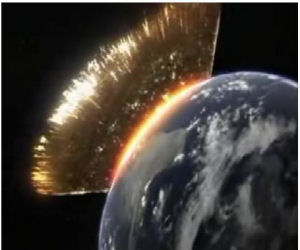 |
|
Call Me Maybe (video)
|
|
Thursday, February 22 12:00 AM ET |
Giant Meteor Heading Toward Earth Covered in GermsBy Brian Briggs |
|||
|
Little Rock, AR - Local news reported that a meteor the size of Alaska hurtling toward Earth could be covered in potentially lethal germs.
"Bacteria have survived under polar ice caps and in molten lava. It wouldn't be a stretch to imagine them surviving on a meteor. If a meteor the size of Alaska was covered in bacteria, it could be harboring more bacteria than every public toilet in the world," said Wallace Jones of NASA. "It's not surprising," he continued. "A public toilet gets cleaned more often than a meteor." Jones also said that the germs have been exposed to cosmic radiation, so they could have mutated into forms for which life on Earth has no natural defenses. To combat this threat, NASA scientists are developing a giant "Lysol" missile which will kill 99.99% of germs on the meteor before it strikes Earth. "That will give the .01% of life that survives the impact a fighting chance," said Jones. Even if the missile is successful, Jones warns that survivors should still avoid touching meteor fragments unless absolutely necessary. "If a piece of meteor is crushing your son's legs, I would touch it," said Jones, "but I'd be sure to wear gloves and wash my hands thoroughly afterwards." An even more nightmarish scenario would have the surviving bacteria aerosolized on impact and make the air we breathe toxic.
"The dust cloud that will encircle the Earth not only would block out the sun for decades, but it could be teeming with bacteria," said Jones. "I recommend wearing a mask." Tests on smaller meteors that have struck Earth haven't shown any signs of germs, but scientists say the possibility still exists. The meteor, named ZG-7134 by NASA scientists, will impact Earth March 21, 2008 at 11:16 am ET.
|


 While the near vacuum of space isn't a perfect breeding ground for germs, scientists have shown that some bacteria and viruses can survive the most extreme conditions.
While the near vacuum of space isn't a perfect breeding ground for germs, scientists have shown that some bacteria and viruses can survive the most extreme conditions.